《大学英语》课程教学资源(教案讲义)新视野大学英语(2/4)

(2)课程名称:新视野大学英语
课程名称:新视野大学英语 (2)
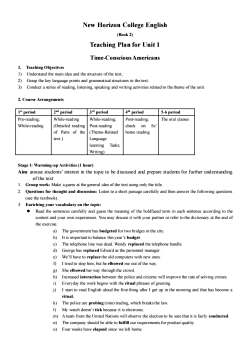
New Horizon College English(Book 2)Teaching Plan for Unit 1Time-ConsciousAmericans1.TeachingObjectives1)Understand the main idea and the structure of the text,2)Grasp the key language points and grammatical structures in the text.3)Conduct a series ofreading, listening, speaking and writing activities related to the theme ofthe unit.2.Course Arrangements1st period2nd period3rd period4 period5-6 periodPre-reading,While-readingWhile-reading,Post-reading,The oral classesWhile-reading(Detailed readingPost-readingcheckSson(Theme-Relatedof Parts of thehomereadingtext.)LanguagelearningTasks;Writing)Stage l:Warming-up Activities (1 hour)Aim: arouse students' interest in the topic to be discussed and prepare students for further understandingofthetextGroup work: Make a guess at the general idea of the text using only the title.1.2.Questions forthought and discussion:Listen to a short passage carefully and then answer the following questions(seethetextbook)Enriching your vocabulary on the topic:3.Read the sentences carefully and guess the meaning of the boldfaced term in each sentence according to thecontext and your own experiences.You may discuss it with your partner orreferto the dictionary at the end ofthe exercise.a)The government has budgeted for two bridges in the cityb)It is important to balance this year's budgetc)The telephone line wasdead.Wendy replaced the telephone handle.d)GeorgehasreplacedEdwardasthepersonnelmanagere)We'll have to replace the old computers with new ones.f)I tried to stop him, but he elbowed me out of the way.g)She elbowed herway through the crowd.h)Increased interactionbetweenthepoliceand citizens will improvetherateof solving crimesi)Everyday the work begins with the ritual phrases of greeting.j)I start to read English aloud the first thing after I get up in the morning and that has become aritual.K)The police are probing(into)trading,which breaks the law.DMy watch doesn't tick because it is electronicm)AteamfromtheUnited Nations will observethe election to be sure that it isfairly conductedn)Thecompany shouldbeabletofulfill ourrequirementsforproductquality0)Fourweekshaveelapsed sincewelefthome
New Horizon College English (Book 2) Teaching Plan for Unit 1 Time-Conscious Americans 1. Teaching Objectives 1) Understand the main idea and the structure of the text; 2) Grasp the key language points and grammatical structures in the text. 3) Conduct a series of reading, listening, speaking and writing activities related to the theme of the unit. 2. Course Arrangements 1 st period 2 nd period 3 rd period 4 th period 5-6 period Pre-reading; While-reading While-reading (Detailed reading of Parts of the text.) While-reading; Post-reading (Theme-Related Language learning Tasks; Writing) Post-reading; check on Ss’ home reading The oral classes Stage 1: Warming-up Activities (1 hour) Aim: arouse students’ interest in the topic to be discussed and prepare students for further understanding of the text 1. Group work: Make a guess at the general idea of the text using only the title. 2. Questions for thought and discussion: Listen to a short passage carefully and then answer the following questions (see the textbook). 3. Enriching your vocabulary on the topic: ⚫ Read the sentences carefully and guess the meaning of the boldfaced term in each sentence according to the context and your own experiences. You may discuss it with your partner or refer to the dictionary at the end of the exercise. a) The government has budgeted for two bridges in the city. b) It is important to balance this year’s budget. c) The telephone line was dead. Wendy replaced the telephone handle. d) George has replaced Edward as the personnel manager. e) We’ll have to replace the old computers with new ones. f) I tried to stop him, but he elbowed me out of the way. g) She elbowed her way through the crowd. h) Increased interaction between the police and citizens will improve the rate of solving crimes. i) Everyday the work begins with the ritual phrases of greeting. j) I start to read English aloud the first thing after I get up in the morning and that has become a ritual. k) The police are probing (into) trading, which breaks the law. l) My watch doesn’t tick because it is electronic. m) A team from the United Nations will observe the election to be sure that it is fairly conducted. n) The company should be able to fulfill our requirements for product quality. o) Four weeks have elapsed since we left home
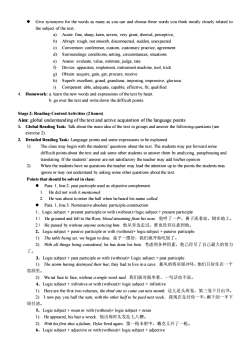
Give synonyms for the words as many as you can and choose three words you think mostly closely related tothe subject ofthetext.a)Acute: fine, sharp, keen, severe, very great, shrewd, perceptive,b)Abrupt: rough, not smooth, disconnected, sudden, unexpectedc)Convention:conference, custom,customary practice,agreementd)Surroundings:conditions, setting,circumstances, situationse)Assess: evaluate, value, estimate, judge, ratef)Device: apparatus, implement, instrument machine, tool,trickg)Obtain: acquire, gain, get, procure, receiveh)Superb: excellent, grand, grandiose, imposing, impressive, gloriousi)Competent: able, adequate, capable, effective,fit, qualified4.Homework:a.learn thenewwords and expressions of the text byheart.b.goover the text and writedown the difficult pointsStage 2: Reading-CentredActivities (2 hours)Aim:global understandingofthetextandactiveacquisitionofthelanguagepoints1.Global Reading Task: Talk about the main idea of the text in groups and answer the following questions (seeexercise 2).2.Detailed Reading Task: Language points and some expressions to be explained1)Theclassmaybeginwith thestudents'questions about thetext.The studentsmayputforward somedifficultpointsabout thetextand ask some other studentstoanswerthembyanalyzing,paraphrasingandtranslating.If thestudents'answerarenot satisfactorytheteachermayaddhis/heropinion2)Whenthestudents havenoquestions theteachermay lead the attention upto thepoints thestudents mayignore or may not understand by asking some other questions about the text.Points that should be solved in class:Para. 1, line 2: past participle used as objective complement:1.Hedidnotwish it mentioned.He was about to enter the hall when heheard his name called.2Para.1,line3:Nominative absoluteparticiple construction1. Logic subject +present participle or with (without)+logic subject+present participleHegroanedandfelltothefloor,blood streamingfiomhisnose.他哼了一声,鼻子流着血,倒在地上。1)2)Hepassedbywithoutanyonenoticinghim.他从旁边走过,谁也没有注意到他。2.Logic subject + passive participle or with (without)+ logic subject + passive participle1)Thetablebeingset,webegantodine桌子一摆好,我们就开始吃饭了。2)Withall thingsbeingconsidered,hehasdonehis best.考虑到各种因素,他己经尽了自己最大的努力了。3. Logic subject + past participle or with (without)+ Logic subject + past participle1)Thestormhavingdestroyedtheirhut,,theyhadtoliveinacave.暴风雨将房屋冲坏,他们只好住在一个窑洞里。2)We satfaceto face,withoutasingleword said.我们面对面坐着,一句话也不说。4.Logic subject+infinitive or with (without)+logic subject + infinitive1)Herearethefirsttwovolumes,thethind oneto comeout nextmonth.这儿是头两卷,第三卷下月出书。2)Inowpayyouhalf thesum,withtheotherhalftobepaid nextweek.我现在先付你一半,剩下的一半下周付清。5.Logic subject +noun or with (without)+logic subject +noun1)Heappeared,hishairawreck.他出现时头发乱七八糟。2)With hisfirst shotafailure,Dykefiredagain.第一枪未射中,戴克又开了一枪。6. Logic subject +adjective or with (without)+logic subject +adjective
⚫ Give synonyms for the words as many as you can and choose three words you think mostly closely related to the subject of the text. a) Acute: fine, sharp, keen, severe, very great, shrewd, perceptive, b) Abrupt: rough, not smooth, disconnected, sudden, unexpected c) Convention: conference, custom, customary practice, agreement d) Surroundings: conditions, setting, circumstances, situations e) Assess: evaluate, value, estimate, judge, rate f) Device: apparatus, implement, instrument machine, tool, trick g) Obtain: acquire, gain, get, procure, receive h) Superb: excellent, grand, grandiose, imposing, impressive, glorious i) Competent: able, adequate, capable, effective, fit, qualified 4. Homework: a. learn the new words and expressions of the text by heart. b. go over the text and write down the difficult points. Stage 2: Reading-Centred Activities (2 hours) Aim: global understanding of the text and active acquisition of the language points 1. Global Reading Task: Talk about the main idea of the text in groups and answer the following questions (see exercise 2). 2. Detailed Reading Task: Language points and some expressions to be explained 1) The class may begin with the students’ questions about the text. The students may put forward some difficult points about the text and ask some other students to answer them by analyzing, paraphrasing and translating. If the students’ answer are not satisfactory the teacher may add his/her opinion 2) When the students have no questions the teacher may lead the attention up to the points the students may ignore or may not understand by asking some other questions about the text. Points that should be solved in class: ⚫ Para. 1, line 2: past participle used as objective complement: 1. He did not wish it mentioned. 2. He was about to enter the hall when he heard his name called. ⚫ Para. 1, line 3: Nominative absolute participle construction 1.Logic subject + present participle or with (without)+logic subject + present participle 1) He groaned and fell to the floor, blood streaming from his nose. 他哼了一声,鼻子流着血,倒在地上。 2) He passed by without anyone noticing him. 他从旁边走过,谁也没有注意到他。 2.Logic subject + passive participle or with (without)+ logic subject + passive participle 1) The table being set, we began to dine. 桌子一摆好,我们就开始吃饭了。 2) With all things being considered, he has done his best. 考虑到各种因素,他已经尽了自己最大的努力 了。 3.Logic subject + past participle or with (without)+ Logic subject + past participle 1) The storm having destroyed their hut, they had to live in a cave. 暴风雨将房屋冲坏,他们只好住在一个 窑洞里。 2) We sat face to face, without a single word said. 我们面对面坐着,一句话也不说。 4.Logic subject + infinitive or with (without)+ logic subject + infinitive 1) Here are the first two volumes, the third one to come out next month. 这儿是头两卷,第三卷下月出书。 2) I now pay you half the sum, with the other half to be paid next week. 我现在先付你一半,剩下的一半下 周付清。 5.Logic subject + noun or with (without)+ logic subject + noun 1) He appeared, his hair a wreck. 他出现时头发乱七八糟。 2) With his first shot a failure, Dyke fired again. 第一枪未射中,戴克又开了一枪。 6.Logic subject + adjective or with (without)+ logic subject + adjective
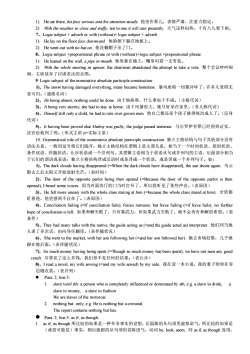
1)Hesatthere,hisfaceseriousandhisattentionsteady他坐在那儿,表情严肃,注意力稳定。2)Withtheweathersocloseandstufy,tentooneitwillrainpresently天气这样闷热,十有八九要下雨。7. Logic subject + adverb or with (without)+logic subject + adverb1)Helayonthefloorfacedowmward.他脸朝下躺在地板上。2)Hewentoutwithnohaton.他没戴帽子出了门。8. Logic subject +prepositional phrase or with (without)+logic subject +prepositional phrase1)Heleanedonthewall,apipeinmouth.他倚靠在墙上,嘴里叼着一支雪茄。2)Withthewholemeetinginuproar,thechairmanabandonedtheattempttotakeavote.整个会议吵闹闹,主席放弃了付诸表决的企图。9.Logic subject of the nominative absolute participle construction1)。Thestormhavingdamagedeverything,manybecamehomeless.暴风雨将一切都冲坏了,许多人变得无家可归。(通格名词)2):Hebeingabsent,nothingcouldbedone.由于他缺席,什么事也干不成。(主格代词)3).Itbeingverystormy,shehadtostayathome.由于风暴很大,她只好呆在家里。(非人称代词)4)。Himselfstillonlyachild,hehadtoruleovergrownmen他自己都还是个孩子就得统治成人了。(反身代词)5)。Ithavingbeen proved that Mulroywasguilty,the judgepassed sentence.马尔罗伊有罪已经得到证实,法官给他判了刑。(形式主语it+实际主语)1o.Grammaticalroleofthenominativeabsoluteparticipleconstruction独立主格结构与句子其他部分没有语法关系,一般用逗号将它们隔开:独立主格结构在逻辑上是主谓关系,相当于一个时间状语、原因状语、条件状语、伴随状语、让步状语或一个并列句,其逻辑主语相当于状语从句或并列句的主语,后面部分相当于它们的谓语或表语:独立主格结构译成汉语时或是译成一个状语,或是译成一个并列句子。如:1).The dark cloudshaving disappeared(=When the dark clouds havedisappeared),the sun shone again.乌云散去之后太阳又开始放射光芒。(表时间)2). The door of the opposite parlor being then opened (=Because the door of the opposite parlor is thenopened),Iheardsomevoices.因为对面客厅的门当时打开了,所以我听见了某些声音。(表原因)3).Hefelt more uneasy with the whole class staring at him (=because the whole class stared at him).全班都町着他,他更感到不自在了。(表原因)4).Conciliation failing (=If conciliation fails), forces remains, but force failing (-if force fails), no furtherhopeofconciliationisleft.如果和解失败了,只有靠武力,但如果武力失败了,就不会再有和解的希望。(表条件)5).They hadmany talks withthe native,theguide acting as(=andtheguide acted as)interpreter.他们同当地人谈了多次话,由向导任翻译。(表伴随状况)6).Shewenttothemarketwithhersonfollowingher(=andhersonfollowedher)她去市场赶集,儿子就跟在她后面。(表伴随状况)7). So much money having being spent (=Though so much money has been spent), we have not seen any goodresult.尽管花了这么多钱,我们却不见任何好结果。(表让步)8).Ireadanovel,mywife sewing(=andmywifesewed)bymyside.我在读一本小说,我的妻子则坐在旁边缝衣装。(表并列)Para.2,line5:1.slave to/of sth: a person who is completely influenced or dominated by sth, e.g. a slave to drink,aslave to money,a slave to fashionWeare slaves ofthemotorcar.2.nothingbut:only,e.g.Heisnothingbutacriminal.The report contains nothing but lies·Para. 2, line 5: as if, as though:1.asif,asthough所比较的如果是一种并非事实的设想,后面跟的从句须用虚拟语气,所比较的如果是(或很可能是)事实,则后面跟的从句须用直陈语气,动词be,look,seem,同asif,asthough连用
1) He sat there, his face serious and his attention steady. 他坐在那儿,表情严肃,注意力稳定。 2) With the weather so close and stuffy, ten to one it will rain presently. 天气这样闷热,十有八九要下雨。 7.Logic subject + adverb or with (without)+ logic subject + adverb 1) He lay on the floor face downward. 他脸朝下躺在地板上。 2) He went out with no hat on. 他没戴帽子出了门。 8.Logic subject +prepositional phrase or with (without)+logic subject +prepositional phrase 1) He leaned on the wall, a pipe in mouth. 他倚靠在墙上,嘴里叼着一支雪茄。 2) With the whole meeting in uproar, the chairman abandoned the attempt to take a vote. 整个会议吵吵闹 闹,主席放弃了付诸表决的企图。 9. Logic subject of the nominative absolute participle construction 1).The storm having damaged everything, many became homeless. 暴风雨将一切都冲坏了,许多人变得无 家可归。(通格名词) 2).He being absent, nothing could be done. 由于他缺席,什么事也干不成。(主格代词) 3).It being very stormy, she had to stay at home. 由于风暴很大,她只好呆在家里。(非人称代词) 4).Himself still only a child, he had to rule over grown men. 他自己都还是个孩子就得统治成人了。(反身 代词) 5).It having been proved that Mulroy was guilty, the judge passed sentence. 马尔罗伊有罪已经得到证实, 法官给他判了刑。(形式主语 it+实际主语) 10. Grammatical role of the nominative absolute participle construction 独立主格结构与句子其他部分没有 语法关系,一般用逗号将它们隔开;独立主格结构在逻辑上是主谓关系,相当于一个时间状语、原因状语、 条件状语、伴随状语、让步状语或一个并列句,其逻辑主语相当于状语从句或并列句的主语,后面部分相当 于它们的谓语或表语;独立主格结构译成汉语时或是译成一个状语,或是译成一个并列句子。如: 1).The dark clouds having disappeared (=When the dark clouds have disappeared), the sun shone again. 乌云 散去之后太阳又开始放射光芒。(表时间) 2).The door of the opposite parlor being then opened (=Because the door of the opposite parlor is then opened), I heard some voices. 因为对面客厅的门当时打开了,所以我听见了某些声音。(表原因) 3).He felt more uneasy with the whole class staring at him (=because the whole class stared at him). 全班都 盯着他,他更感到不自在了。(表原因) 4).Conciliation failing (=If conciliation fails), forces remains; but force failing (=if force fails), no further hope of conciliation is left. 如果和解失败了,只有靠武力,但如果武力失败了,就不会再有和解的希望。(表 条件) 5).They had many talks with the native, the guide acting as (=and the guide acted as) interpreter. 他们同当地 人谈了多次话,由向导任翻译。(表伴随状况) 6).She went to the market, with her son following her (=and her son followed her). 她去市场赶集,儿子就 跟在她后面。(表伴随状况) 7).So much money having being spent (=Though so much money has been spent), we have not seen any good result. 尽管花了这么多钱,我们却不见任何好结果。(表让步) 8).I read a novel, my wife sewing (=and my wife sewed) by my side. 我在读一本小说,我的妻子则坐在旁 边缝衣裳。(表并列) ⚫ Para. 2, line 5: 1. slave to/of sth: a person who is completely influenced or dominated by sth, e.g. a slave to drink, a slave to money, a slave to fashion We are slaves of the motorcar. 2. nothing but: only, e.g. He is nothing but a criminal. The report contains nothing but lies. ⚫ Para. 2, line 5: as if, as though: 1. as if, as though 所比较的如果是一种并非事实的设想,后面跟的从句须用虚拟语气,所比较的如果是 (或很可能是)事实,则后面跟的从句须用直陈语气,动词 be, look, seem, 同 as if, as though 连用
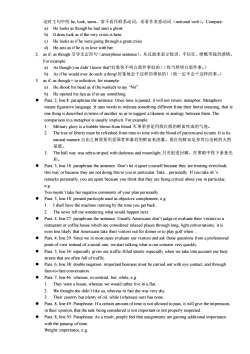
这时主句中的be,look,Seem,常不看作联系动词,而看作表意动词(notionalverb)。Compare:He looks as though he had seen a ghost.a)b)It does look as if the very crisis is hereHe looks as if he were going through a great crisis.c)d) He acts as if he is in love with her.2.asif,asthough引导无定形句(amorphoussentence),从反面来表示惊、不信任、债概等强烈感情。Forexample:a)Asthoughyoudidn'tknowthat?好象你不明白那件事似的!(你当然明白那件事。)b)Asifhewouldeverdosuchathing!好象他会干这样的事似的!(他一定不会干这样的事。)3.as if, as though + to infinitive, for example:a)He shook his head as if(he wanted) to say“No"b) He opened his lips as ifto say something.Para.2, line 8:paraphrase the sentence:Once time is passed, it will not return.metaphor, Metaphorsmeans figurativelanguage.It uses words to indicate something differentfrom their literal meaning,that is:one thing is described in terms of another so as to suggest a likeness or analogy between them.Thecomparison inametaphor is usually implicit.Forexample:1Militarygloryisabubbleblownfromblood.军事荣誉是用般红般的鲜血吹成的气泡。2.The tree of liberty must be refreshed from time totime with theblood of patriots and tyrants.It is itsnaturalmanure.自由之树需要用爱国者和暴君的鲜血来浇灌。殷红的鲜血是养育自由树的天然基肥。3.Thehallwaywaszebra-stripedwithdarknessandmoonlight.月光射进回廊,在黑暗中投下条条光彩。Para. 3, line 18: paraphrase the sentence:Don't let it upset yourself because they are treating everybody?this way or because they are not doing this to you in particular. Take...personally:If you take sb.'sremarks personally,you are upset because you think that they are being critical about you in particular,e.g.You mustn't take her negative comments of your plan personallyPara. 3, line 18: present participle used as objective complement, e.g.I shall have the machine running by the time you get back.L.2.ThenewsleftmewonderingwhatwouldhappennextPara.4, line27:paraphrase the sentence:UsuallyAmericans don't judge or evaluate their visitors in aOrestaurant or coffee housewhich are considered relaxedplacesthroughlong,lightconversations, it isevenless likelythatAmericans taketheir visitors outfordinner or toplaygolfwhen..Para. 4, line 29: Since we in most cases evaluate our visitors and ask those questions from a professional?point of view instead of a social one, we start talking what is our concern very quickly.Para.5, line34:especiallygiven ourtraffic-filled streets:especially when wetake into account our busystreets that are often full oftraffic.Para.6,line38:doublenegation:important business mustbecarried out witheyecontact,and throughface-to-faceconversation.Para. 7, line 46: whereas: in contrast, but, while, e.g.They want a house, whereas we would rather live in a flat.1.We thought she didn't like us, whereas in fact she was very shy.2.3.Theircountryhasplenty ofoil, while (whereas)ourshas nonePara.8,line49:Paraphrase:Ifacertain amountoftimeis notallowed topass, itwill givetheimpressionOin their opinion, that the task being considered is not important or not properly respected.Para.8, line 50:Paraphrase:As a result,peoplefeel that assignments are gaining additional importancewith the passing of time.Weight:importance, e.g
这时主句中的 be, look, seem,常不看作联系动词,而看作表意动词(notional verb)。Compare: a) He looks as though he had seen a ghost. b) It does look as if the very crisis is here. c) He looks as if he were going through a great crisis. d) He acts as if he is in love with her. 2. as if, as though 引导无定形句(amorphous sentence),从反面来表示惊讶、不信任、愤慨等强烈感情。 For example: a) As though you didn’t know that?好象你不明白那件事似的!(你当然明白那件事。) b) As if he would ever do such a thing!好象他会干这样的事似的!(他一定不会干这样的事。) 3. as if, as though + to infinitive, for example: a) He shook his head as if (he wanted) to say “No”. b) He opened his lips as if to say something. ⚫ Para. 2, line 8: paraphrase the sentence: Once time is passed, it will not return. metaphor; Metaphors means figurative language. It uses words to indicate something different from their literal meaning, that is: one thing is described in terms of another so as to suggest a likeness or analogy between them. The comparison in a metaphor is usually implicit. For example: 1. Military glory is a bubble blown from blood.军事荣誉是用殷红般的鲜血吹成的气泡。 2. The tree of liberty must be refreshed from time to time with the blood of patriots and tyrants. It is its natural manure.自由之树需要用爱国者和暴君的鲜血来浇灌。殷红的鲜血是养育自由树的天然 基肥。 3. The hall way was zebra-striped with darkness and moonlight.月光射进回廊,在黑暗中投下条条光 彩。 ⚫ Para. 3, line 18: paraphrase the sentence: Don’t let it upset yourself because they are treating everybody this way or because they are not doing this to you in particular. Take.personally: If you take sb.’s remarks personally, you are upset because you think that they are being critical about you in particular, e.g. You mustn’t take her negative comments of your plan personally. ⚫ Para. 3, line 18: present participle used as objective complement, e.g. 1. I shall have the machine running by the time you get back. 2. The news left me wondering what would happen next. ⚫ Para. 4, line 27: paraphrase the sentence: Usually Americans don’t judge or evaluate their visitors in a restaurant or coffee house which are considered relaxed places through long, light conversations, it is even less likely that Americans take their visitors out for dinner or to play golf when . ⚫ Para. 4, line 29: Since we in most cases evaluate our visitors and ask those questions from a professional point of view instead of a social one, we start talking what is our concern very quickly. ⚫ Para. 5, line 34: especially given our traffic-filled streets: especially when we take into account our busy streets that are often full of traffic. ⚫ Para. 6, line 38: double negation: important business must be carried out with eye contact, and through face-to-face conversation. ⚫ Para. 7, line 46: whereas: in contrast, but; while, e.g. 1. They want a house, whereas we would rather live in a flat. 2. We thought she didn’t like us, whereas in fact she was very shy. 3. Their country has plenty of oil, while (whereas) ours has none. ⚫ Para. 8, line 49: Paraphrase: If a certain amount of time is not allowed to pass, it will give the impression, in their opinion, that the task being considered is not important or not properly respected. ⚫ Para. 8, line 50: Paraphrase: As a result, people feel that assignments are gaining additional importance with the passing of time. Weight: importance, e.g
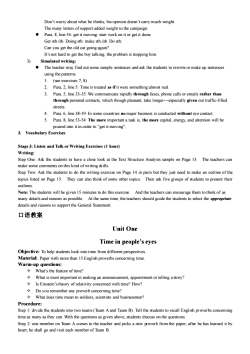
Don't worry about what he thinks; his opinion doesn't carry much weightThe many letters of support added weight to the campaignPara.8, line 54:get it moving:start work on it orget it doneGet sth./sb. Doing sth: make sth./sb, Do sth:Can you get the old car going again?It's not hard to get the boy talking, the problem is stopping him.3)Simulated writing:Theteacher mayfind out some sample sentences and ask the students to rewrite or makeup sentencesusing the patterns.1.(see exercises 7, 8)2.Para, 2, line 5:Time is treated as if it were something almost realPara. 5, line 33-35: We communicate rapidly through faxes, phone calls or emails rather than3.through personal contacts, which though pleasant, take longer---especially given our traffic-filledstreets.4.Para.6, line 38-39:In some countries no major business is conducted without eye contact.5.Para. 8, line 53-54: The more important a task is, the more capital, energy, and attention will bepoured into it in order to “get it moving".3.VocabularyExercisesStage 3: Listen and Talk or Writing Exercises (1 hour)Writing:Step One: Ask the students to have a close look at the Text Structure Analysis sample on Page 13.The teachers canmakesomecommentsonthiskind ofwritingskills.Step Two: Ask the students to do the writing exercise on Page 14 in pairs but they just need to make an outline of thetopics listed on Page15.They can alsothink of someother topics.Then ask fivegroups of students topresent theiroutlinesNote:The students will begiven15minutes todothis exercise.And theteachers can encouragethem to think of asmany details and reasons as possible.At the same time, the teachers should guide the students to select the appropriatedetails and reasons to support the General Statement.口语教案Unit OneTime in people's eyesObjective:To help students look into time from different perspectives.Material: Paper with more than 15 English proverbs concerning time.Warm-up questions:?What's thefeature oftime?★What is most important in making an announcement, appointment or telling a story?Is Einstein's theory of relativity concerned with time? How??Do you remember any proverb concerning time??What does time mean to soldiers, scientists and businessmen?Procedure:Step 1: divide the students into two teams (Team A and Team B). Tell the students to recall English proverbs concerningtime as many as they can.With the questions as given above, students discuss on the questions.Step 2:one member on Team A comes to the teacher and picks a new proverb from the paper, after he has learned it byheart, he shall go and visit eachmember of Team B
Don’t worry about what he thinks; his opinion doesn’t carry much weight. The many letters of support added weight to the campaign. ⚫ Para. 8, line 54: get it moving: start work on it or get it done. Get sth./sb. Doing sth: make sth./sb. Do sth: Can you get the old car going again? It’s not hard to get the boy talking; the problem is stopping him. 3) Simulated writing: ⚫ The teacher may find out some sample sentences and ask the students to rewrite or make up sentences using the patterns. 1. (see exercises 7, 8) 2. Para, 2, line 5: Time is treated as if it were something almost real. 3. Para. 5, line 33-35: We communicate rapidly through faxes, phone calls or emails rather than through personal contacts, which though pleasant, take longer-especially given our traffic-filled streets. 4. Para. 6, line 38-39: In some countries no major business is conducted without eye contact. 5. Para. 8, line 53-54: The more important a task is, the more capital, energy, and attention will be poured into it in order to “get it moving”. 3. Vocabulary Exercises Stage 3: Listen and Talk or Writing Exercises (1 hour) Writing: Step One: Ask the students to have a close look at the Text Structure Analysis sample on Page 13. The teachers can make some comments on this kind of writing skills. Step Two: Ask the students to do the writing exercise on Page 14 in pairs but they just need to make an outline of the topics listed on Page 15. They can also think of some other topics. Then ask five groups of students to present their outlines. Note: The students will be given 15 minutes to do this exercise. And the teachers can encourage them to think of as many details and reasons as possible. At the same time, the teachers should guide the students to select the appropriate details and reasons to support the General Statement. 口语教案 Unit One Time in people’s eyes Objective: To help students look into time from different perspectives. Material: Paper with more than 15 English proverbs concerning time. Warm-up questions: What’s the feature of time? What is most important in making an announcement, appointment or telling a story? Is Einstein’s theory of relativity concerned with time? How? Do you remember any proverb concerning time? What does time mean to soldiers, scientists and businessmen? Procedure: Step 1: divide the students into two teams (Team A and Team B). Tell the students to recall English proverbs concerning time as many as they can. With the questions as given above, students discuss on the questions. Step 2: one member on Team A comes to the teacher and picks a new proverb from the paper; after he has learned it by heart; he shall go and visit each member of Team B
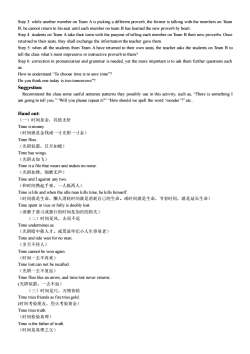
Step3:whileanothermemberonTeam Aispickinga differentproverb,theformer is talkingwiththemembers onTeamB; he cannot return to his seat until each member on teamBhas learned the newproverb byheart.Step 4: students on Team A take their turns with the purpose of telling each member on Team B their new proverbs. Oncereturnedtotheir seats,they shall exchangethe information theteachergavethemStep5:when all the students fromTeamAhavereturnedtotheirown seats,theteacher asksthe students onTeamBtotell theclasswhat'smost impressiveorinstructiveproverbtothem?Step 6:correction in pronunciation and grammar is needed, yet themore important is to ask themfurther questions suchas:How to understand To choose time is to save time"?Do you think one today is two tomorrows"?Suggestion:Recommendtheclass someuseful sentencepatternstheypossiblyuseinthisactivity,suchas,Thereis somethingIam going to tell you.""Will you please repeat it?""How should we spell the word wonder'?"etc..Hand out:(一)时间是金,其值无价Timeismoney.(时间就是金钱或一寸光阴一寸金)Time flies.(光阴似箭,日月如梭)Time has wings.(光阴去如飞)Time isa filethat wears and makes no noise(光阴如锉,细磨无声)Time and I against anytwo(和时间携起手来,一人抵两人)Time islifeandwhen theidlemankillstime, hekillshimself(时间就是生命,懒人消耗时间就是消耗自已的生命。或时间就是生命,节省时间,就是延长生命)Time spent in vice or folly is doubly lost.(消磨于恶习或愚行的时间是加倍的损失)(二)时间是风,去而不返Time undermines us.(光阴暗中催人才。或莫说年纪小人生容易老)Timeandtidewaitfornoman(岁月不待人)Time cannotbewon again.(时间一去不再来)Time lost can not berecalled(光阴一去不复返)Timeflieslike an arrow,and time lostnever returns.(光阴似箭,一去不返)(三)时间是尺,万物皆检Time tries friends as fire tries gold(时间考验朋友,烈火考验黄金)Time tries truth(时间检验真理)Time is the father of truth.(时间是真理之父)
Step 3: while another member on Team A is picking a different proverb, the former is talking with the members on Team B; he cannot return to his seat until each member on team B has learned the new proverb by heart. Step 4: students on Team A take their turns with the purpose of telling each member on Team B their new proverbs. Once returned to their seats, they shall exchange the information the teacher gave them. Step 5: when all the students from Team A have returned to their own seats, the teacher asks the students on Team B to tell the class what’s most impressive or instructive proverb to them? Step 6: correction in pronunciation and grammar is needed, yet the more important is to ask them further questions such as: How to understand “To choose time is to save time”? Do you think one today is two tomorrows”? Suggestion: Recommend the class some useful sentence patterns they possibly use in this activity, such as, “There is something I am going to tell you.” “Will you please repeat it?” “How should we spell the word ‘wonder’?” etc. Hand out: (一)时间是金,其值无价 Time is money. (时间就是金钱或一寸光阴一寸金) Time flies. (光阴似箭,日月如梭) Time has wings. (光阴去如飞) Time is a file that wears and makes no noise. (光阴如锉,细磨无声) Time and I against any two. (和时间携起手来,一人抵两人) Time is life and when the idle man kills time, he kills himself. (时间就是生命,懒人消耗时间就是消耗自己的生命。或时间就是生命,节省时间,就是延长生命) Time spent in vice or folly is doubly lost. (消磨于恶习或愚行的时间是加倍的损失) (二)时间是风,去而不返 Time undermines us. (光阴暗中催人才。或莫说年纪小人生容易老) Time and tide wait for no man. (岁月不待人) Time cannot be won again. (时间一去不再来) Time lost can not be recalled. (光阴一去不复返) Time flies like an arrow, and time lost never returns. (光阴似箭,一去不返) (三)时间是尺,万物皆检 Time tries friends as fire tries gold. (时间考验朋友,烈火考验黄金) Time tries truth. (时间检验真理) Time is the father of truth. (时间是真理之父)
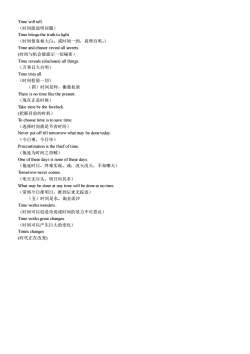
Time will tell.(时间能说明问题)Time brings the truth to light.(时间使真相大白。或时间一到,真理自明。)Time and chance reveal all secrets.(时间与机会能提示一切秘密)Time reveals (discloses) all things.(万事日久自明)Time tries all.(时间检验一切)(四)时间是秤,衡量权质There is notimelikethepresent.(现在正是时候)Take time bythe forelock(把握目前的时机)To choose timeis to savetime(选择时间就是节省时间)Never put off till tomorrow what may be done today.(今日事,今日毕)Procrastination is thethiefof time(拖延为时间之窃贼)Oneof thesedays is noneofthesedays.(拖延时日,终难实现。或:改天改天,不知哪天)Tomorrownevercomes.(明天无尽头,明日何其多)Whatmaybe done at anytime will bedone at no time(常将今日推明日,推到后来无踪迹)(五)时间是水,淘金流沙Time works wonders.(时间可以创造奇迹或时间的效力不可思议)Time works great changes.(时间可以产生巨大的变化)Times changes(时代正在改变)
Time will tell. (时间能说明问题) Time brings the truth to light. (时间使真相大白。或时间一到,真理自明。) Time and chance reveal all secrets. (时间与机会能提示一切秘密) Time reveals (discloses) all things. (万事日久自明) Time tries all. (时间检验一切) (四)时间是秤,衡量权质 There is no time like the present. (现在正是时候) Take time by the forelock. (把握目前的时机) To choose time is to save time. (选择时间就是节省时间) Never put off till tomorrow what may be done today. (今日事,今日毕) Procrastination is the thief of time. (拖延为时间之窃贼) One of these days is none of these days. (拖延时日,终难实现。或:改天改天,不知哪天) Tomorrow never comes. (明天无尽头,明日何其多) What may be done at any time will be done at no time. (常将今日推明日,推到后来无踪迹) (五)时间是水,淘金流沙 Time works wonders. (时间可以创造奇迹或时间的效力不可思议) Time works great changes. (时间可以产生巨大的变化) Times changes (时代正在改变)
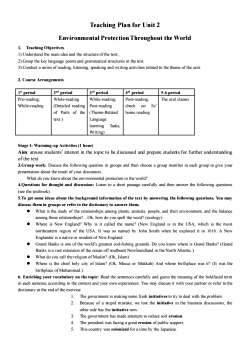
Teaching Plan for Unit 2EnvironmentalProtectionThroughout the World1.Teaching ObjectivesI) Understand the main idea and the structure of the text,2)Graspthekeylanguagepoints andgrammatical structures inthetext3) Conduct a series ofreading, listening,speaking and writing activities related to the theme ofthe unit.2.Course Arrangements1st period2nd period3rd period4t period5-6 periodPre-reading,While-readingWhile-reading,Post-reading,The oral classesWhile-reading(Detailed readingPost-readingcheckonSsof Partsof the(Theme-Relatedhomereadingtext.)LanguagelearningTasks,Writing)Stage1:Warming-upActivities(1 hour)Aim:arousestudents'interestinthetopictobediscussedandpreparestudentsforfurtherunderstandingofthetext3.Group work: Discuss the following question in groups and then choose a group member in each group to give yourpresentation about theresult of your discussion.Whatdoyouknowabouttheenvironmental protection intheworld?4.Questions for thought and discussion: Listen to a short passage carefully and then answer the following questions(see the textbook).5.To get some ideas about the background information of the text by answering the following questions. You maydiscuss them in groups or refer to the dictionary to answer them.What is the study of the relationships among plants, animals, people, and their environment, and the balanceamong these relationships?... Ok, how do you spell the word? (ecology)Where isNewEngland?Why is itcalled thename?(NewEnglandisintheUSA,whichisthemostnortheasternregionoftheUSAItwas sonamedbyJohnSmithwhenheexplored itin1616.ANewEnglanderis anativeorresidentof NewEngland.Grand Banks is one of the world's greatest cod-fishing grounds. Do you know where is Grand Banks? (GrandBanks is a vast extension of the ocean off southeast Newfoundland in the North Atlantic.)What do vou call thereligion of Muslin? (Ok.Islam)Where is the chief holy city of Islam? (Ok, Mecca or Makkah) And whose birthplace was it? (It was thebirthplace of Muhammad.)6. Enriching your vocabulary on the topie: Read the sentences carefully and guess the meaning of the boldfaced termin eachsentenceaccordingto thecontextand your own experiences.You maydiscuss it withyourpartnerorrefertothedictionaryattheendoftheexerciseThe government is making some fresh initiatives to try to deal with the problem1.2.Because of a stupid mistake, we lost the initiative in the business discussions; theother side has the initiative now.The government has made attempts to reduce soil erosion.3.4.The president was facing a great erosion of public support.5.This country was colonized for a time by the Japanese
Teaching Plan for Unit 2 Environmental Protection Throughout the World 1. Teaching Objectives 1) Understand the main idea and the structure of the text; 2) Grasp the key language points and grammatical structures in the text. 3) Conduct a series of reading, listening, speaking and writing activities related to the theme of the unit. 2. Course Arrangements 1 st period 2 nd period 3 rd period 4 th period 5-6 period Pre-reading; While-reading While-reading (Detailed reading of Parts of the text.) While-reading; Post-reading (Theme-Related Language learning Tasks; Writing) Post-reading; check on Ss’ home reading The oral classes Stage 1: Warming-up Activities (1 hour) Aim: arouse students’ interest in the topic to be discussed and prepare students for further understanding of the text 3.Group work: Discuss the following question in groups and then choose a group member in each group to give your presentation about the result of your discussion. What do you know about the environmental protection in the world? 4.Questions for thought and discussion: Listen to a short passage carefully and then answer the following questions (see the textbook). 5.To get some ideas about the background information of the text by answering the following questions. You may discuss them in groups or refer to the dictionary to answer them. ⚫ What is the study of the relationships among plants, animals, people, and their environment, and the balance among these relationships?.Ok, how do you spell the word? (ecology) ⚫ Where is New England? Why is it called the name? (New England is in the USA, which is the most northeastern region of the USA. It was so named by John Smith when he explored it in 1616. A New Englander is a native or resident of New England. ⚫ Grand Banks is one of the world’s greatest cod-fishing grounds. Do you know where is Grand Banks? (Grand Banks is a vast extension of the ocean off southeast Newfoundland in the North Atlantic.) ⚫ What do you call the religion of Muslin? (Ok, Islam) ⚫ Where is the chief holy city of Islam? (Ok, Mecca or Makkah) And whose birthplace was it? (It was the birthplace of Muhammad.) 6. Enriching your vocabulary on the topic: Read the sentences carefully and guess the meaning of the boldfaced term in each sentence according to the context and your own experiences. You may discuss it with your partner or refer to the dictionary at the end of the exercise. 1. The government is making some fresh initiatives to try to deal with the problem. 2. Because of a stupid mistake, we lost the initiative in the business discussions; the other side has the initiative now. 3. The government has made attempts to reduce soil erosion. 4. The president was facing a great erosion of public support. 5. This country was colonized for a time by the Japanese
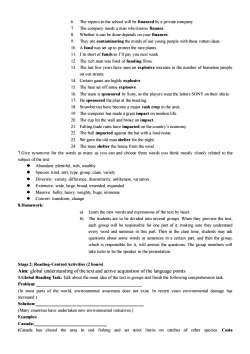
6.The repairs to the school will be financed by a private company.7.Thecompanyneedsamanwhoknowsfinance9.Whether itcanbedonedepends onyourfinances9.Theyarecontaminatingtheminds ofouryoungpeoplewiththeserottenideas.10.Afund was set up to protect the rare plants.11.1I'm short of funds so I'll pay you next week.12.Therich man was fond of fundingfilms13.Thelastfewyearshaveseenan explosiveincreaseinthenumberof homelesspeopleonourstreets.14.Certain gases are highly explosive15.Theheat setoff someexplosive16.TheteamissponsoredbySony,sotheplayerswearthelettersSONYontheirshirts17.He sponsored the plan at the meeting18.Strawberrieshavebecome a major cashcrop in the area19.The computer has made a great impact on modern life.20.The cup hit the wall and broke on impact.21.Falling trade rates have impacted on the country's economy22.The ball impacted against the bat witha loud noise23.Wegave the old man shelter for the night.24.The trees shelter the house from the wind7.Give synonyms for the words as many as you can and choose three words you think mostly closely related to thesubject ofthe text..Abundant: plentiful, rich, wealthy?Species: kind, sort, type, group, class, variety.Diversity:variety,difference,dissimilarity,unlikeness,variationExtensive: wide, large, broad, extended, expanded?Massive: bulky, heavy, weighty, huge, immense?Convert: transform, change8.Homework:a)Learnthenewwords and expressions ofthetextbyheart.b)The students are to be divided into several groups. When they previewthe text,each group will be responsible for one part of it, making sure they understandevery word and sentence inthispartThen intheclass time, students mayaskquestions about some words or sentences in a certain part, and then the group,which is responsible for it, will answer the questions.The group members willtaketurnstobethe speaker inthepresentation.Stage 2: Reading-CentredActivities (2 hours)Aim: global understanding of the text and active acquisition of the language points1.Global Reading Task: Talk about the main idea of the text in groups and finish the following comprehension taskProblem:(Inmostpartsof theworld environmental awarenessdoesnot exist.In recentyears environmental damagehasincreased.)Solution:(Many countries have undertaken new environmental initiatives.)Examples:Canada:(Canada has closed theareatocodfishingandsetstrictlimits oncatchesofotherspecies.Costa
6. The repairs to the school will be financed by a private company. 7. The company needs a man who knows finance. 8. Whether it can be done depends on your finances. 9. They are contaminating the minds of our young people with these rotten ideas. 10. A fund was set up to protect the rare plants. 11. I’m short of fundsso I’ll pay you next week. 12. The rich man was fond of funding films. 13. The last few years have seen an explosive increase in the number of homeless people on our streets. 14. Certain gases are highly explosive. 15. The heat set off some explosive. 16. The team is sponsored by Sony, so the players wear the letters SONY on their shirts. 17. He sponsored the plan at the meeting. 18. Strawberries have become a major cash crop in the area. 19. The computer has made a great impact on modern life. 20. The cup hit the wall and broke on impact. 21. Falling trade rates have impacted on the country’s economy. 22. The ball impacted against the bat with a loud noise. 23. We gave the old man shelter for the night. 24. The trees shelter the house from the wind. 7.Give synonyms for the words as many as you can and choose three words you think mostly closely related to the subject of the text. ⚫ Abundant: plentiful, rich, wealthy ⚫ Species: kind, sort, type, group, class, variety ⚫ Diversity: variety, difference, dissimilarity, unlikeness, variation ⚫ Extensive: wide, large, broad, extended, expanded ⚫ Massive: bulky, heavy, weighty, huge, immense ⚫ Convert: transform, change 8.Homework: a) Learn the new words and expressions of the text by heart. b) The students are to be divided into several groups. When they preview the text, each group will be responsible for one part of it, making sure they understand every word and sentence in this part. Then in the class time, students may ask questions about some words or sentences in a certain part, and then the group, which is responsible for it, will answer the questions. The group members will take turns to be the speaker in the presentation. Stage 2: Reading-Centred Activities (2 hours) Aim: global understanding of the text and active acquisition of the language points 1.Global Reading Task: Talk about the main idea of the text in groups and finish the following comprehension task. Problem: _ (In most parts of the world, environmental awareness does not exist. In recent years environmental damage has increased.) Solution:_ (Many countries have undertaken new environmental initiatives.) Examples: Canada:_ (Canada has closed the area to cod fishing and set strict limits on catches of other species. Costa
按次数下载不扣除下载券;
注册用户24小时内重复下载只扣除一次;
顺序:VIP每日次数-->可用次数-->下载券;
- 《大学英语》课程教学资源(教案讲义)新视野大学英语(1/4).doc
- 《大学英语》课程教学资源(参考资料)大学英语四级考试思考.doc
- 《大学英语》课程教学资源(参考资料)大学英语四级听力应试技巧汇编.doc
- 《大学基础英语》课程PPT教学课件(四)Lesson One Thinking as a Hobby.ppt
- 《大学基础英语》课程PPT教学课件(四)Lesson Two Waiting for the Police.ppt
- 《大学基础英语》课程PPT教学课件(四)Lesson three Why Historians Disagree.ppt
- 《大学基础英语》课程PPT教学课件(四)Lesson Four A Drink in the Passage.ppt
- 《大学基础英语》课程PPT教学课件(四)Lesson Nine The Most Dangerous Game.ppt
- 《大学基础英语》课程PPT教学课件(四)Lesson Five Man of the Moment.ppt
- 《大学基础英语》课程PPT教学课件(四)Lesson Seven Spring Sowing.ppt
- 《大学基础英语》课程PPT教学课件(三)Lesson 04 Wisdom of Bear Wood Michael Welzenbach.ppt
- 《大学基础英语》课程PPT教学课件(三)Lesson 03 Michael Dell’s Two-Billion-Dollar Dream.ppt
- 《大学基础英语》课程PPT教学课件(三)Lesson 02 Discovery of a father.ppt
- 《大学基础英语》课程PPT教学课件(三)Lesson 01 your college years.ppt
- 《大学基础英语》课程PPT教学课件(三)Lesson 06 Twelve Angry Men(Part Two).ppt
- 《大学基础英语》课程PPT教学课件(三)Lesson 05 Twelve Angry Men(Part One).ppt
- 《大学基础英语》课程PPT教学课件(三)Lesson 07 The Rivals Martin Armstrong.ppt
- 《大学基础英语》课程PPT教学课件(三)Lesson 08 We’re Only Human Laura Schlessinger.ppt
- 《大学基础英语》课程PPT教学课件(二)Lesson Two Maheegun My Brother.ppt
- 《大学基础英语》课程PPT教学课件(二)Lesson One Another Schol Year- What For?.ppt
- 《大学英语》课程教学资源(教案讲义)新视野大学英语(3/4).doc
- 《大学英语》课程教学资源(教案讲义)新视野大学英语(4/4).doc
- 《大学英语》课程教学资源(参考资料)四级英语考试英译汉必备知识.ppt
- 《大学英语》课程教学资源(参考资料)大学英语四级写作备课指南.doc
- 《大学英语》课程教学资源(参考资料)英汉翻译——翻译理论与实践.ppt
- 《大学英语》课程参考资料(作文写作)keys to writing.doc
- 《大学英语》课程参考资料(作文写作)作文模式.doc
- 《大学英语》课程参考资料(作文写作)参考文章.doc
- 《大学英语》课程参考资料(作文写作)图表.doc
- 《大学英语》课程参考资料(作文写作)大学英语四级选词解题技巧.ppt
- 《大学英语》课程参考资料(作文写作)概述.doc
- 《大学英语》课程参考资料(作文写作)第一讲 基本理论.doc
- 《大学英语》课程参考资料(作文写作)第七讲 利弊.doc
- 《大学英语》课程参考资料(作文写作)第三讲 段首句.doc
- 《大学英语》课程参考资料(作文写作)第九讲 解决问题.doc
- 《大学英语》课程参考资料(作文写作)第二讲 段落构思.doc
- 《大学英语》课程参考资料(作文写作)第五讲 图表作文.doc
- 《大学英语》课程参考资料(作文写作)第八讲 解释原因.doc
- 《大学英语》课程参考资料(作文写作)第六讲 对立观点即疑问句题目.doc
- 《大学英语》课程参考资料(作文写作)第十一讲 书信.doc
